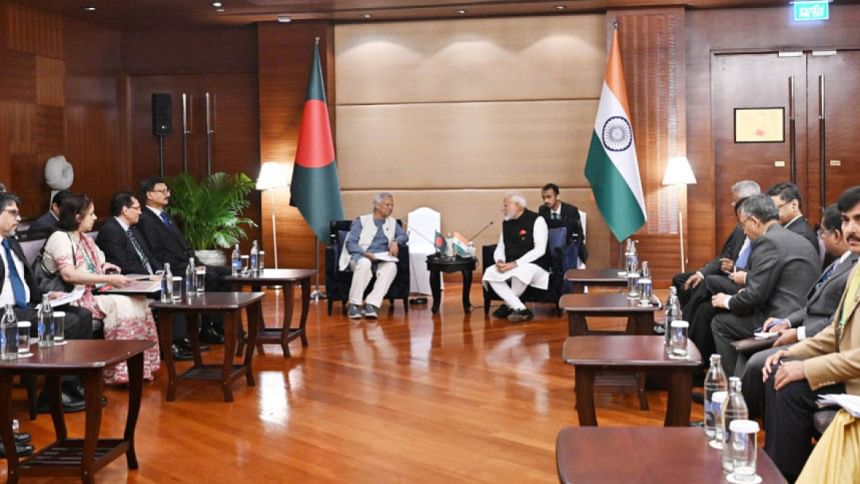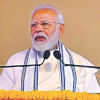A diplomatic reset wrapped in contradiction

The Yunus-Modi meeting in Bangkok appears to be the long-awaited diplomatic reset that many had predicted—but few expected to materialise so soon. On the surface, it looks like India is finally acknowledging the interim government in Dhaka. But beneath the handshake seemingly lies a tangle of contradictions, strategic hedging, and diplomacy. It's not just about turning a new page—it's about writing the next chapter.
From denial to dialogue
For nearly eight months, India's relationship with Bangladesh has remained awkward, intermittently broken by a handful of uplifting moments when officials met and discussed bilateral issues. This meeting, therefore, signals more than engagement. It's an implicit admission that reality has outpaced India's assumptions. Yet, Modi's words seem to carry an almost performative tone—he talked about democracy and inclusion after years of openly backing elections in Bangladesh that were anything but democratic. His government supported Hasina through the 2014 walkover, the 2018 ballot-stuffing, and the 2024 puppet show of a vote. So, when Indian officials say they support a "democratic and inclusive Bangladesh," one cannot help but ask: since when?
The people vs the party
Modi claims India is connected to the people of Bangladesh—not to any political party. It's a noble sentiment, but history arguably tells a different story. India's deep-rooted ties with the Awami League were not merely diplomatic—some may say they were ideological, strategic, and personal. Delhi has in the past prioritised regime stability over popular legitimacy. So, is this newfound detachment real, or just rhetorical repositioning now that the old guard has fallen? Perhaps Modi's statement is less about people and more about giving India room to pivot—to distance itself from Hasina without appearing disloyal, and to engage with Yunus without committing too deeply.
Shelter as strategy
Yunus's call for Hasina's extradition was bold, necessary, and symbolic. It marked a shift from transitional governance to assertive leadership. But India's non-committal response—labelling the request as "under consideration"—could suggest that Hasina is now less a guest and more a bargaining chip. By sheltering her, India retains leverage over the interim government. It's a contradictory position—India claims to support peace and stability in Bangladesh, yet it harbours a figure accused of inciting unrest. If Yunus is serious about moving forward, he'll have to navigate this situation delicately.
Security concerns and political theatre
The discussion on minority rights and social unrest is another minefield of double meanings. India expressed "serious concern" about the treatment of Hindus in Bangladesh—likely as much for domestic political optics as for genuine worry. Yunus, meanwhile, dismissed many of the claims as exaggerated or false, pushing back on India's moral posturing. Here again, India's selective outrage feels somewhat hollow. It had no such concerns under Hasina, even when systemic violence and suppression were rife. The sudden spotlight on minority rights raises the question: is this about human rights or political messaging?
Border killings and hollow empathy
Yunus made a heartfelt appeal to stop border killings, invoking the suffering of families torn apart. Modi responded with the usual line—Indian forces fire in self-defence. Yet, hundreds of civilians have died in these so-called "self-defence" incidents over the years, often unarmed and within Bangladeshi territory. This isn't just a bilateral security issue—it's about trust. If India continues to act unilaterally on its border while preaching partnership, the credibility of its cooperative rhetoric falls apart.
The real game behind the optics
So, what does this meeting really represent? For me, it's not as much of a breakthrough. It's a calibration. India is adjusting to—not embracing—the new Bangladesh. This is not about Yunus earning India's trust; it's about India hedging its bets. Delhi wants to remain relevant, especially as Dhaka's ties with China deepen and with Pakistan open. India isn't fully on board with the interim government yet. But it is experienced enough to realise that ignoring it any longer could cost regional influence. The meeting, therefore, is less about conviction and more about pragmatism.
Mohammad Al-Masum Molla is a journalist at The Daily Star. He can be reached at [email protected].
Views expressed in this article are the auhtor's own.
Follow The Daily Star Opinion on Facebook for the latest opinions, commentaries and analyses by experts and professionals. To contribute your article or letter to The Daily Star Opinion, see our guidelines for submission.

 For all latest news, follow The Daily Star's Google News channel.
For all latest news, follow The Daily Star's Google News channel. 







Comments